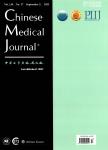Genomic correlates of the response to first-line PD-1 blockade plus chemotherapy in patients with advanced non-small-cell lung cancer
Genomic correlates of the response to first-line PD-1 blockade plus chemotherapy in patients with advanced non-small-cell lung cancer作者机构:Department of Medical Oncology Shanghai Pulmonary Hospital & Thoracic Cancer Institute Tongji University School of Medicine Shanghai China Department of Thoracic Surgery Shanghai Pulmonary Hospital & Genecast Biotechnology Co. Ltd Wuxi Jiangsu China Biomedical Innovation Center Beijing Shijitan Hospital Capital Medical University Beijing China School of Oncology Capital Medical University Beijing China
出 版 物:《中华医学杂志(英文版)》 (Chinese Medical Journal)
年 卷 期:2024年第137卷第18期
页 面:2024 Aug 21页
核心收录:
学科分类:1002[医学-临床医学] 100214[医学-肿瘤学] 10[医学]
基 金:This study was supported by grants from the National Natural Science Foundation of China(Nos. 82102859, 82172869, 82141101, 82272875, and 12126605) the Shanghai Rising-Star Program(Nos. 23QA1408000 and 22QA1407800) the Shanghai "Rising Stars of Medical Talent" Youth Development Program Youth Medical Talents—Specialist Program, the Original Exploration Project of Shanghai Natural Science Foundation(No. 23ZR1480600) the Health and Family Planning Commission of Shanghai Municipality(No. 20224Y0067)
主 题:Non-small-cell lung cancer (NSCLC) Programmed death 1 (PD-1) blockade Gene panel Prediction Biomarker
摘 要:Background: Programmed death 1 (PD-1) blockade plus chemotherapy has become the new first-line standard of care for patients with advanced non-small-cell lung cancer (NSCLC). Yet not all NSCLC patients benefit from this regimen. This study aimed to investigate the predictors of PD-1 blockade plus chemotherapy in untreated advanced ***: We integrated clinical, genomic, and survival data from 287 patients with untreated advanced NSCLC who were enrolled in one of five registered phase 3 trials and received PD-1 blockade plus chemotherapy or chemotherapy alone. We randomly assigned these patients into a discovery cohort (n = 125), a validation cohort (n = 82), and a control cohort (n = 80). The candidate genes that could predict the response to PD-1 blockade plus chemotherapy were identified using data from the discovery cohort and their predictive values were then evaluated in the three cohorts. Immune deconvolution was conducted using transcriptome data of 1014 NSCLC patients from The Cancer Genome Atlas ***: A genomic variation signature, in which one or more of the 15 candidate genes were altered, was correlated with significantly inferior response rates and survival outcomes in patients treated with first-line PD-1 blockade plus chemotherapy in both discovery and validation cohorts. Its predictive value held in multivariate analyses when adjusted for baseline parameters, programmed cell death ligand 1 (PD-L1) expression level, and tumor mutation burden. Moreover, applying both the 15-gene panel and PD-L1 expression level produced better performance than either alone in predicting benefit from this treatment combination. Immune landscape analyses revealed that tumors with one or more variation in the 15-gene panel were associated with few immune infiltrates, indicating an immune-desert tumor ***: These findings indicate that a 15-gene panel can serve as a negative prediction biomarker for first-line PD-1 blockade plus ch



